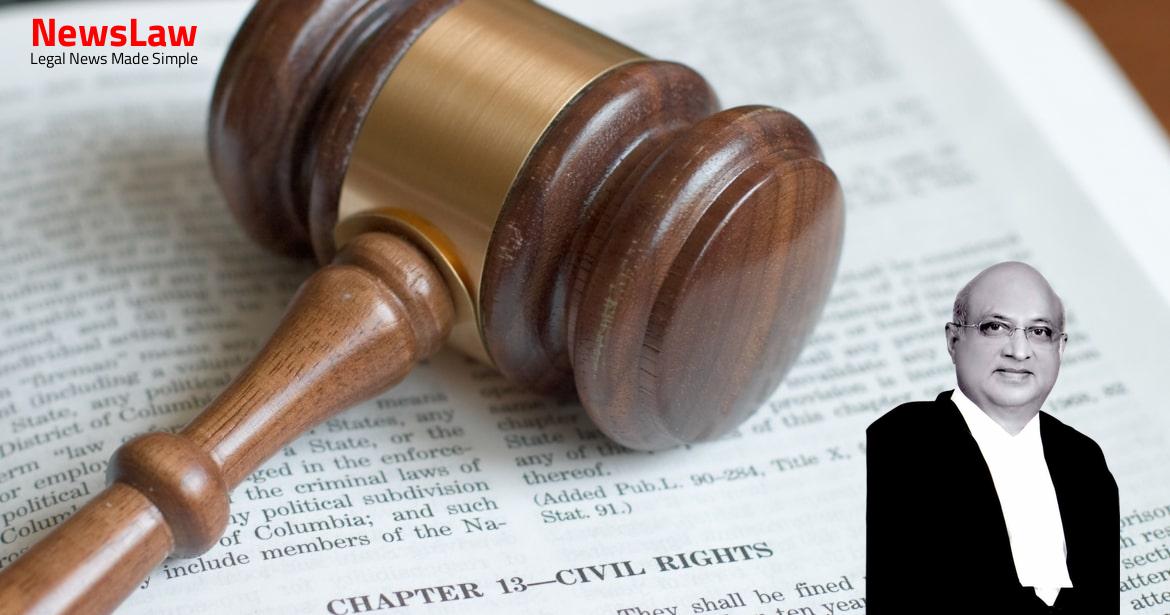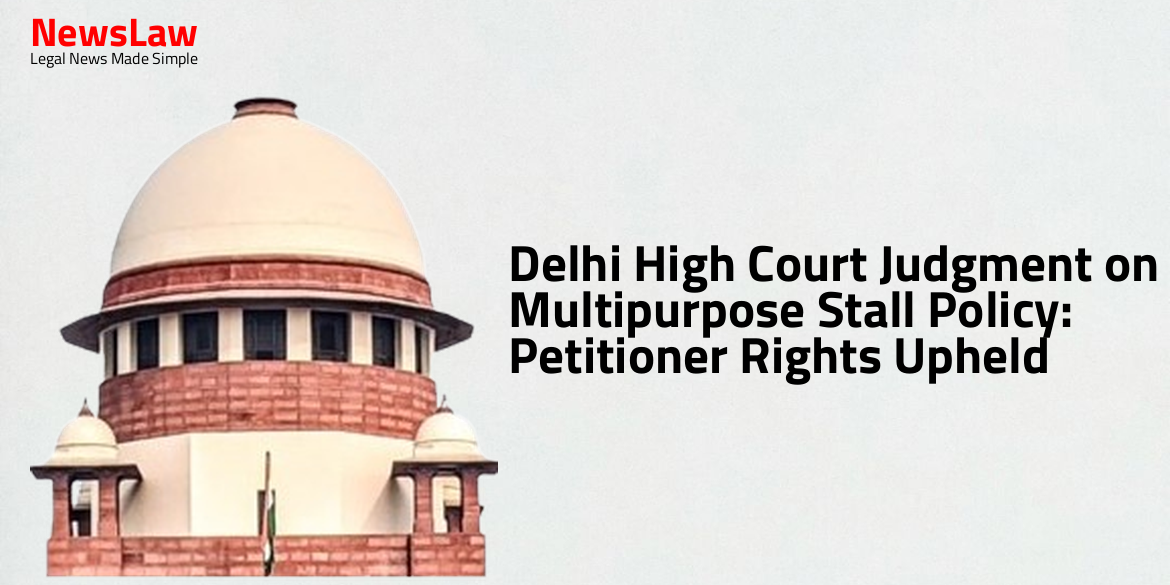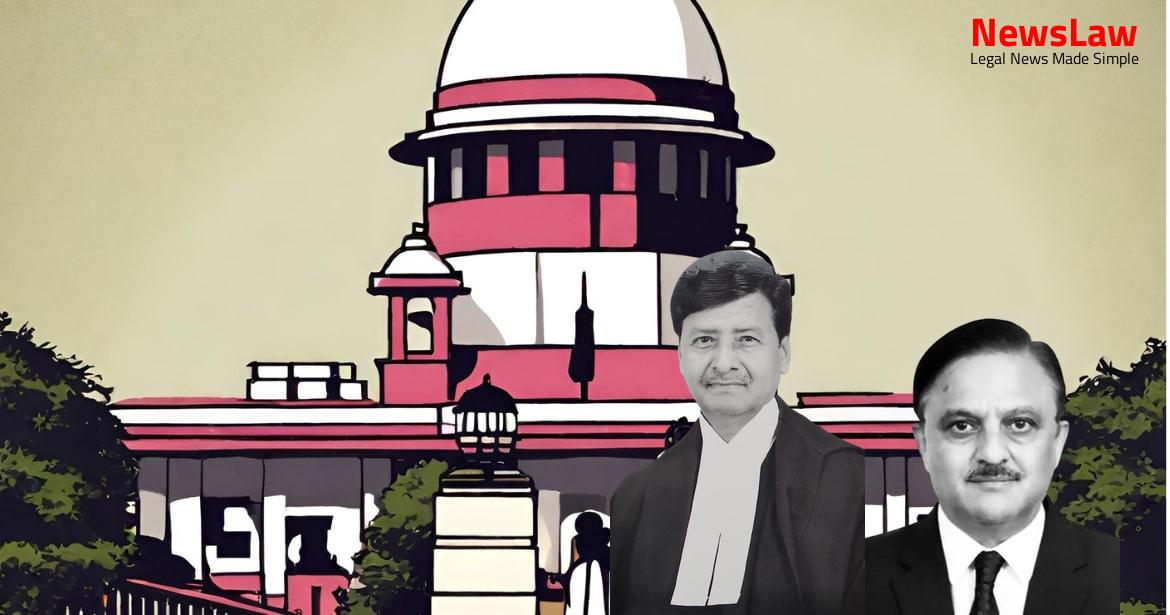Exploring the seniority dispute in Fast Track Court appointments, a recent legal case analyzed by the Supreme Court sheds light on the complexities surrounding ad hoc appointments and regular appointments. The case delves into the claims of individuals appointed as ad hoc District Judges, challenging the denial of seniority from the date of their initial appointment in 2003. The judgment provides insights into the rules governing Fast Track Court appointments and the implications for seniority. Stay tuned for a detailed analysis of this intriguing case.
Facts
- Notification issued by the High Court on 28.05.2004 for regular appointments to District & Sessions Judges
- Interim order passed by the Supreme Court in Civil Appeal No.1276 of 2005 regarding appointments subject to civil appeal result
- Civil appeal disposed off on 19.04.2012 in Brij Mohan Lal (2) v. Union of India & Ors.
- Ad hoc appointment of the appellant as a District Judge in 2003
- Writ petition by ad hoc District Judges for absorption against regular vacancies
- High Court’s dismissal of the writ petition on 13.07.2004
- Filing of Special Leave Petition (C) No.17338 of 2004 in response to the High Court’s judgment
- Validity of notification dated 28.05.2004 and claims of absorption by ad hoc District Judges examined by the Supreme Court
- The appointments will take effect when the respective officers assume charge.
- Officers will be on probation for two years as per the A.P. State Judicial Service Rules, 2007.
- Qualifying marks for general candidates is 40% aggregate, and for SC/ST/OBC candidates is 35%.
- Direct recruits to FTCs can be appointed to the regular cadre of Higher Judicial Services after certain procedures.
- Procedure for regularization includes a written examination and an interview by a Selection Committee.
- 150 marks for the written exam and 100 marks for the interview.
- Notification issued by the High Court on 13.08.2012 invited applications for regular cadre District Judges from ad hoc Fast Track Court District Judges.
- Appellants responded to the notification and were appointed as regular District Judges on 02.07.2013.
Also Read: Quash Petition Dismissed: Case Summary of accused nos. 5 to 7
Arguments
- The appellants are claiming seniority in the cadre of District Judges from the initial date of their appointment in 2003.
- They argue that since they were appointed to the post of District Judges through a process similar to regular appointments, they should not be denied seniority.
- They cite relevant judgments to support their claim for seniority from the date of their initial appointment.
- The High Court contends that the appointments of the appellants as ad hoc District Judges were specifically for presiding over Fast Track Courts under special rules.
- The High Court rejects their claim for absorption and asserts that it is not permissible for the appellants to seek seniority from their initial appointment date.
Also Read: Hyatt Hotel vs. The State of India: Corporate Liability and Vicarious Responsibility
Analysis
- The claim of seniority between direct recruits and promotees was brought into question.
- Appellants initially appointed as ad hoc District Judges cannot claim seniority over regularly appointed individuals.
- The rules for appointment to Fast Track Courts are separate from regular appointments in State Higher Judicial Services.
- The plea of appellants for absorption into regular cadre posts was rejected by the High Court and upheld by the Supreme Court.
- Appellants appointed to preside over Fast Track Courts are not entitled to regular promotions based on ad hoc appointments.
- Seniority depends on various factors including nature of appointment and rules governing the appointments.
- Appellants cannot claim seniority based on ad hoc appointments to Fast Track Courts.
- Appointments for Fast Track Courts are distinct from regular appointments to District Judge posts.
- Seniority does not accrue to ad hoc recruits for regular promotions based on ad hoc appointments.
- The appointments made for Fast Track Courts are ad hoc and separate from regular cadre appointments.
- Appellants’ claim for seniority based on ad hoc appointments is rejected by the High Court.
- High Court observed appellants conveniently challenged the Government Order after benefiting from the appointment.
- In case vacancies are not available in the regular cadre, State Governments must create additional vacancies as needed
- Additional vacancies should be created in accordance with the number of selected candidates
- The judgment in the case of Brij Mohan Lal (2) v. Union of India & Ors. has directions that need to be complied with.
- Paragraph 25 of the judgment is relevant for the cases in question.
- The paragraph states the specific direction that needs to be followed.
- Judgment in the case of V. Venkata Prasad & Ors. v. High Court of Andhra Pradesh & Ors. held that ad hoc appointments in respect of Fast Track Courts do not confer any rights to the appointees.
- Such appointments are considered ad hoc in nature by the court, as per A.P. State Higher Judicial Service Special Rules for Ad Hoc Appointments, 2001.
- The view of the court in this case supports the stance of the respondents.
- Senior counsel Sri Venkataramani also cited other judgments in support of this position.
- Service rendered as Fast Track Court Judges to be counted for pensionary and other benefits
- Service length to be considered for determining pension and other retiral benefits
Also Read: State of West Bengal vs. Respondents: Abetment of Suicide Case
Decision
- The civil appeal arises from a judgment passed by the High Court of Judicature at Hyderabad for the State of Telangana and the State of Andhra Pradesh.
- The appellant challenged paragraph nos.5 and 6 of G.O.MS. No.68 dated 02.07.2013 as unconstitutional and illegal in a writ petition.
- The appellant’s writ petition in Writ Petition No. 13022 of 2017 was dismissed by the High Court.
- The civil appeals were filed aggrieved by the High Court’s judgment and final order.
- The appellants and others similarly placed are given the benefit of counting their service as Fast Track Judges for pensionary and other retiral benefits.
- The civil appeals are disposed of with no order as to costs.
Case Title: KUM C. YAMINI Vs. THE STATE OF ANDHRA PRADESH
Case Number: C.A. No.-006296-006296 / 2019



